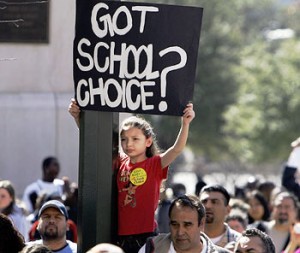DC Voucher Study Jumps to Conclusions
If the “Letters to the Editor” section allowed more words, here’s everything we would have said…
A recent editorial in the St. Louis Post-Dispatch admonished school reform supporters to “trust the data, not loosely grounded ideology.”
But trusting the data means trusting all of the data.
The Post-Dispatch editorial slamming school choice followed a study released by the Institute of Education Science (IES) showing that students who were given the chance to attend private schools through the Washington D.C. Opportunity Scholarship Program (OSP) had lower-performing math test scores in the first year of participating in the program than students who did not receive the vouchers.
On the face of it, that data set seems pretty bad for those arguing that applying free market principles to education will lead to major improvements in student success.
But figuring out how to improve our country’s failing education system is much more complex than simply looking at one data set, and when the OSP is looked at through the broader lens of over a decade of data and research it is clear that enacting school choice programs has a lasting and valuable impact on students’ lives.
In the decade since the OSP was created, D.C.’s public, charter and private schools have seen considerable growth in student achievement.
There has also been considerable growth of charter school offerings in the nation’s capital, growing from 67 in 2008 to 94 today, giving parents, whether they win a voucher in the OSP lottery or not, the option to choose the best school. The impact of this consumer demand for a quality education on the improved test scores for the district over the past decade cannot be denied.
This key point highlights just one of the many failings in the IES study — the fact that it was comparing test scores between students using vouchers with students who were attending schools, both traditional public and charter, which had already improved as a result of a more competitive school marketplace.
In fact, 42 percent of the control group in the study attended a charter school and 10 percent attended a private school.
The second major issue with the study is that it only focused on achievement during the first year of participating in the voucher program, looking at how well students did after moving to a new school and all of the social and academic stress that such a move entails. A wealth of studies has shown that student mobility has a direct impact on academic performance. Any study focusing only on the first year after a move to a new school is setting itself up for questionable data.
Indeed, an April 2017 study of the OSP released by the University of Arkansas showed that D.C. students in the voucher program scored significantly higher in reading in their second, third, and fourth years in the program.
The study also did not take into account the funding, and consequentially the access to quality education, provided through the OSP, where vouchers only provide about $9,422 in funding per student — a big difference from the $21,000 paid to charter schools and the $30,000 paid to district schools.
While the program provides parents with some choice, that choice is limited to the lower tier of private school offerings and is still not providing the true market-based competition that will truly improve education.
Finally, the study lauded by the Post-Dispatch editorial board fails to take into consideration big-picture, real-world outcomes like the impact of vouchers on graduation rates and school safety.
Previous studies of the OSP showed that participating students increased their chance of graduating from high school by as much as 12 percent. That is a big margin which has big impacts later in the students’ lives, especially when it comes to their potential for lifetime earnings.
When you take all of that data together, you end up with a vastly different picture of how voucher programs can transform education.
Giving parents and students greater choice in schools, spurring the growth of new educational opportunities, improving test scores after multiple years in the program and increasing graduation rates, all through a minimally funded program sounds almost exactly like what that “loosely grounded ideology” has been promising would happen.
You can read the Post Dispatch editorial here. Read our Letter to the Editor as it appeared, here.
« Previous Post: Parent Perspective
» Next Post: CEAM training program grows as parent-leaders emerge
